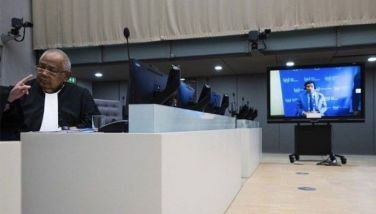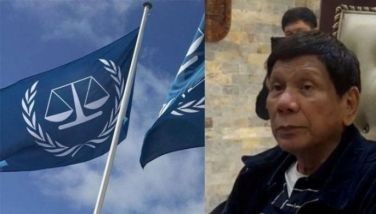Indo-Pacific Quad: Relevance to Philippines

The Philippines has to date focused its strategy to counter China’s aggressive claim to the South China Sea/West Philippine Sea (SCS/WPS) through on and off bilateral discussions, and by relying on an ASEAN collective approach.
At the bilateral level, the Philippines sought to strengthen its hand by utilizing the UN arbitral court ruling invalidating China’s claim to gain global support. It had also secured clarification from the US that the Mutual Defense Treaty (MDT) covers the South China Sea. Unfortunately, right from the outset, the Duterte administration undermined these negotiating chips and chose instead to go to extreme lengths to curry China’s favor in the hope of securing economic benefits. Duterte announced the Philippines was eschewing its traditional alliance with the US and announced the termination of the Visiting Forces Agreement (VFA). He called the UN arbitral ruling as little more than a piece of scrap paper. Banking on what he perceives as his personal friendship with China’s Xi Jinping, Duterte has preferred bilateral talks. But these bilateral talks have yet to yield anything of significance. Some critics have characterized it as no more than a conversation between “lord and vassal.” As President Duterte nears the end of his term, these promised benefits have yet to materialize. China, in the meantime, has stepped up its aggressive actions to control this vital waterway for global commerce with its rich fishing grounds and potential major deposits of hydrocarbon.
Within ASEAN, negotiations on a Code of Conduct on the South China Sea have dragged on with little progress. China has been quite happy to string this along. Moreover, the South China Sea issue has been cast as a proxy dispute between superpowers China and the United States. With basic economic realities favoring China rather than the United States, there has been little appetite among ASEAN countries to choose sides. Individually, countries like Indonesia and Vietnam, have stood up to assert their sovereign rights in the face of Chinese incursions. But collectively, ASEAN has been ineffective in any regional effort to moderate China’s aggressive behavior.
It has become apparent that the country’s current bilateral and regional approach is not succeeding.
Quadrilateral Security Dialogue
There are other developments though in terms of regional alliance that could prove to be viable options for the Philippines moving forward. In 2007, the Quadrilateral Security Dialogue comprised of Australia, India, Japan, and the United States – otherwise referred to as the Quad – came into existence. While it was not billed as such, the dialogue was widely viewed as a response to China’s rise as a military and economic power. It was for that reason that Australia, under Kevin Rudd, subsequently withdrew from the dialogue, but rejoined following his departure. However, it was not until 2017 that the Quad was formally reconvened and has since then started to coalesce into a more formal body following the intensification of bilateral disputes between China on the one hand and India, Australia and Japan on the other. President Biden’s desire to revitalize relations with allies that his predecessor had undermined with his ‘America First policy,’ may hasten this process. In a 2021 joint statement, “The Spirit of the Quad,” Quad members described “a shared vision for a “Free and Open Indo-Pacific,” and a “rules-based maritime order in the East and South China Seas.” Subsequently, it held a Quad-Plus dialogue which included Vietnam, South Korea, and New Zealand.
At the same time, the geographical term “Indo-Pacific” has come to be a widely-recognized regional concept. Introduced by the Obama administration, it has come to define America’s current security strategy in East Asia. Subsequently, the United States, Australia, Japan, India, France, the United Kingdom, Indonesia and ASEAN adopted “Indo-Pacific” as a policy symbol of regional engagement. The European Union has expressed support for a free and open Indo-Pacific concept with preserving the universal principle of freedom of navigation at its core. This will justify “meaningful European naval presence in the region” though ostensibly the goal was to safeguard their sea lines of communications with their Asian markets.
Chinese Lake a la ‘Monroe Doctrine’
Chinese leadership has reacted by claiming that these developments are being fomented by those outside the region and are meant to contain China’s peaceful rise. That these “troublemakers” threaten peace and stability in the region and China’s good relations with her neighbors. My view is that below the surface, the core issue is whether countries within and outside the region are comfortable with China’s unstated desire to turn the South China Sea into a “Chinese lake” – a sort of equivalent to the US Monroe Doctrine in the Americas. Based on China’s recent track record and projected trajectory, under President-for-life Xi, there are more national leaders losing sleep over this prospect than those who welcome it.
If this is the case, then the Quad, which China seems to be seriously paying attention to, presents an additional foundation for the Philippines to craft more effective policies and actions in the SCS/WPS in support of its bilateral and regional efforts. But this will require electing our next president to be one of those losing sleep over what is happening in the SCS/WPS. There is little expectation that President Duterte will change course for the remainder of his term and the same can be expected from his anointed successor. Your guess is as good as mine as to which candidate China will be “rooting for.”
- Latest
- Trending





























